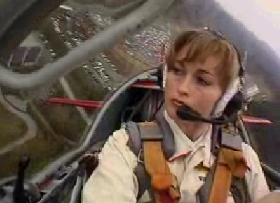 |
→ June 2005 Contents → E-bits
|
E-bits
|
 |
|
Last month's E-Bits was devoted to pondering nomadism vs. civilization, and ways of escaping the confines of stationary or sedentary life through the Internet. It seems there are many other ways to combat the feeling of being hedged in, trapped, squeezed together or that it's just plain too crowded. Those of us who live in major cities surely know the feeling of being too close for comfort, but as a general phenomenon, we are more apt to feel like sardines when on a crowded highway, on a jam-packed airline flight, or in a vehicle such as the Shinkansen Bullet Train in Japan--all experiences which occur, ironically, while we are actually in motion. Statistics show that population density varies widely among countries of the world. According to the United Nations Human Development Report and the CIA World Factbook, the United States has about 28 people per square kilometer, while Japan has 333; the U.K. has 241; and Canada, only 3. Iraq has 53.3 people per square kilometer; Saudi Arabia has 10.6; and the Gaza Strip has a whopping 2,927.8. China varies from about 10 to 400 inhabitants per square kilometer, depending on which part of the country is measured, urban or rural. Housing floor space in terms of average square feet per person is another question altogether. Recently, some apartment buildings in Shenzhen, China ,were destroyed in a spectacular video broadcast on international TV. Take a closer look, not at the demolition, but at the apartments themselves, by clicking on the photo below to see a gallery of images that will stimulate the imagination.
On the same day last week two things arrived over e-mail. The first was a quote by Jules de Gaultier, which says, "Imagination is the one weapon in the war against reality." That seemed like a new spin on an interesting subject, even though Einstein talked much of imagination. He said he depended more on imagination than knowledge in describing how he developed his theory of relativity. He also said that we cannot solve our present problems by the mindset that created them; even Arnold Schwarzenegger referred to the Einsteinian call for imagination recently in an interview. These days we are all challenged into a kind of war against reality, or maybe FOR a new reality. Just like the nomads, we are compelled to move from one way of thinking to another, and our imaginations, along with the tools available to us, are going to take us there. Meanwhile, imagination not only helps us to create new solutions and circumstances, but also provides an opportunity for a little temporary relief whilst we stagnate in the moment, a common problem. Who hasn't dreamt of flying, defying gravity, soaring above it all--metaphors for escaping reality--that bring us to the second item that arrived over e-mail. The following flying video from Haute Voltige of the 2002 FAI Grand Prix gave me an exhilarating adventure. My imagination took flight as I sat right here looking at my desktop. See if it takes you away as well, by clicking on the photo below.
The political battles in the Senate this past month were enough Reality TV for anybody, and all month long I kept one eye on the unfolding drama of the fate of the filibuster and whether or not John Bolton would be confirmed as Ambassador to the U.N. As I ponder the dramatic events, the subject of imagination crept into mind, and I kept my other eye peeled for something inspirational. Along came several absolutely magnificent photos of mammatus cloud formations, the likes of which I have never seen, which literally defy the imagination. Why does nature inspire us so? Perhaps if we focused more on nature and less on creating drama we would find answers we hadn't known were there all the time. I found the description of mammatus clouds inspiring, even without first viewing the photos: "Mammatus clouds can be a remarkable sight, especially when sunlight is reflected off of them ... sometimes ominous in appearance, mammatus clouds are harmless and do not mean a tornado is about to form, a common misconception ... in fact, they are usually seen after the worst of a thunderstorm has passed." Click on the photo below to see more mammatus clouds over Hastings, Nebraska, photographed by Jorn Olsen.
We learned more about mammatus clouds and other weather phenomena from the University of Nebraska's High Plains Regional Climate Center. If you wish, you can also visit the photographer at his personal site, http://www.mammatusclouds.com.
In line with the possibilities of imagination, Nikki McNamee reminds us about the Myth of the Hundredth Monkey. According to the Skeptics Dictionary, this phenomenon refers to a sudden spontaneous and mysterious leap of consciousness achieved when a critical mass point is reached. Experiments by Kinji Imanishi, who studied the behavior of macaque monkeys given sweet potatoes on Japan's Koshima Island in 1952, reveal an interesting phenomenon. A juvenile macaque began washing her potatoes to clean off the dirt, and she soon taught another monkey, who taught another, who taught another, and so forth. Before long, all the monkeys on the island were washing potatoes to clean them. That much is scientifically documented. The additional myth says that when the hypothetical 99th monkey on the island learned to wash potatoes, all the monkeys on the other islands, isolated from physical contact with the original monkeys, spontaneously started washing potatoes without having been taught, showing a leap of consciousness that defied time and space.
Myth or no myth, it is still true that monkeys and other primates learn from each other, and so do we. It is also true that cyberspace defies time and space. So often do our imaginations break down the limitations of space-time, and we have all experienced a leap of consciousness from time to time. The more imagination we can muster, the more we can learn from each other's ideas. Many Cyber Nomads out there are wandering into previously unknown territory. The Digital Journalist wants you to tell us where you are going and where you have been, so we can learn from you and share it with others.
As summer 2005 gets underway in the Northern Hemisphere, and winter begins in the Southern Hemisphere, have a great, imaginative month of June.
© Beverly Spicer
The links that appear in this column are from the World Wide Web. Credit is given where the creator is known. The Digital Journalist and the author claim no copyright ownership of any video or photographic materials that appear herein. |
|
Back to June 2005 Contents
|
|



